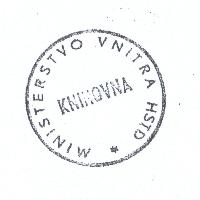The Central Press Supervision Authority files, stored at the Security Services Archive in Prague, contain materials documenting the control of press and newly issued publications in Czechoslovakia from 1953 to 1968. Examples of censorship with extensive transcriptions from ‘defective’ literary works are very valuable as they include unknown information on the ways authors and editors negotiated with the censors, reveal the origins of the works, provide information on the alterations that were imposed and the existence of text variants, and they even cover prominent authors’ previously unknown works.
-
Vieta:
-
Na Struze 3, 110 00 Praha 1, Czech Republic
-
Temos:
-
Įkūrimo data:
-
Charakteringi eksponatai:
The collection includes documents created or collected by the Cinematography Commission of the Government of People's Republic of Croatian in period 1947-1951, which testify to control over motion picture production by the communist regime established in Yugoslavia/Croatia after the Second World War. Such control was manifested through Party and state management of film production companies, the approval of screenplays, supervision of the import and distribution of motion pictures for screening in cinemas, and verification of the ideological suitability of qualified personnel (directors, producers, film editors, actors).
-
Vieta:
-
Zagreb Trg Marka Marulića 21, Croatia 10000
-
Temos:
-
Įkūrimo data:
-
Charakteringi eksponatai:
The Mirel Leventer private collection of photographs and films is the richest archive of images from the period of glory of Club A, 1969–1989, when it operated as a (semi-) clandestine and exclusive club, founded and administered by students of the Institute of Architecture in Bucharest (today the Ion Mincu University of Architecture and Urbanism). Club A was an oasis of freedom created in a basement in the middle of the historic area of the capital of communist Romania for the purpose of being able to organise shows, debates, and concerts that would be an alternative to the officially promoted culture, and to offer young people a place where they could behave as if they were free. In short, the Mirel Leventer private collection preserves the memory of an essential place for the alternative culture of young people in the last two decades of Romanian communism.
-
Vieta:
-
București Strada Blănari 14, Romania 030167
-
Temos:
-
Įkūrimo data:
-
Charakteringi eksponatai:
The collection was started with the need to preserve and promote the legacy of Polish journalists and photographers who documented the social, cultural and political reality in socialist times. The members of the Association "The Road" want to show the everyday life of peasants, workers and intelligentsia in Poland on the photographs which sometimes were not shown or published due to press censorship (official censorship or self-control of the editors who decided not to publish certain materials).
-
Vieta:
-
Warszawa Marszałkowska 140, Poland
-
Temos:
-
Įkūrimo data:
-
Charakteringi eksponatai:
The Collection of Historical Interviews is one of the most significant oral history collections in Hungary. It is a mixed collection of life story interviews that were done with the intention of creating materials for oral history narratives, and a lot of the archived interviews were conducted during the production of historical documentaries beginning in the 1960s. The latter usually cover one aspect or chapter in a person’s life. The materials constitute a particularly useful source for the study of the history of Hungarian television. However, the scope of the collection is such that it contains a lot of references to figures of the cultural opposition. The history of the collection itself represents a narrative of nonconformist cultural practices.
-
Vieta:
-
Budapest Szent György tér 4-5-6., Hungary 1014
-
Temos:
-
Įkūrimo data:
-
Charakteringi eksponatai:




